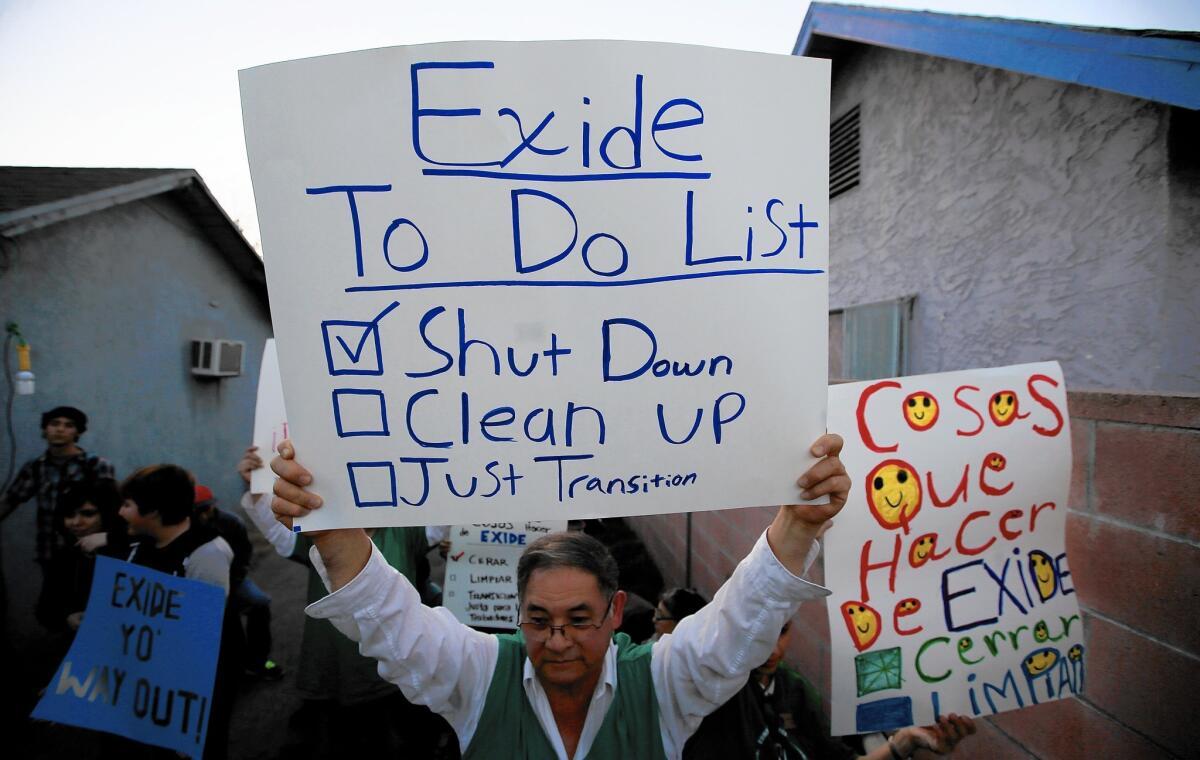State’s Exide cleanup pace stirs ire among residents in southeast L.A. County

Community members and activists gather in a backyard of a home east of downtown Los Angeles to celebrate the closure of the Exide Technologies battery recycling plant on March 12.
- Share via
Furious residents reacted with deep skepticism Thursday as California environmental regulators revealed a plan to use $7 million in state money to quickly expand testing and cleanup of lead-contaminated properties surrounding a closed battery recycling plant in Vernon.
California Department of Toxic Substances Control officials faced a barrage of questions at a public meeting in Huntington Park following news last week that soil testing shows air pollution from the Exide Technologies facility deposited toxic lead dust across a wider area of southeast L.A. County than previously estimated, possibly fouling as many as 10,000 homes up to 1.7 miles away.
Department Director Barbara Lee pledged to use $3 million of the new money to begin cleaning the most contaminated properties: those already tested that have lead concentrations above 1,000 parts per million. California recommends further health screenings when lead exceeds 80 parts per million.
Lee said the department would use an additional $3 million of the funds to develop and carry out a new round of soil testing at more homes in Boyle Heights, Maywood, Huntington Park, Commerce and other communities where homes may have been contaminated by the facility’s lead emissions.
She said the state “will use all legal avenues to recover costs” from Exide and other parties that might be responsible, and will explore using lead remediation funds from other state, local and federal government programs.
“We are going to act as quickly as possible,” Lee said.
But the agency’s plan did not satisfy many residents at the hearing.
“Why am I hearing about a plan to make another plan?” said Terry Gonzalez-Cano, whose Boyle Heights home was tested last year. She said the tests of her yard detected lead levels as high as 1,550 parts per million and that she was still waiting for it to be cleaned up.
“If you can’t handle this problem, get out of the way and let some federal agency in,” Gonzalez-Cano said. “Clean up the properties starting tomorrow. I don’t want to hear any excuses. I just want it done. No more people need to be exposed to this.”
Also on Thursday, Los Angeles County Supervisor Hilda Solis, who represents communities around the Exide Technologies plant, called on Gov. Jerry Brown to appoint an independent expert to oversee the cleanup and a commission to investigate the ordeal.
“We can’t afford to wait another week, two weeks,” Solis said in an interview. “We need immediate action.”
Solis’ comments echoed the demands of community groups, who have accused state toxics regulators of being slow to acknowledge the extent of contamination and of dragging their feet with the cleanup. Over the last year, the department has removed and replaced lead-contaminated soil from the 146 homes closest to the plant in Maywood and Boyle Heights, at a cost of about $40,000 each.
The toxic control agency “has really done nothing to stop or clean up the mess,” said Jose Antonio Gutierrez, a Huntington Park resident who grew up near the plant in Vernon and said he suffers many health problems from lifelong exposure to its lead emissions. “When will your agency act rather than talk?”
California officials allowed the battery recycler to operate for 33 years with only a temporary permit, even as it racked up dozens of violations for releasing pollution into the air and water, sparking fierce protest from community groups and lawmakers.
In March, Exide struck a deal with the U.S. attorney’s office to shut down the lead-acid battery smelter, which had been in operation since 1922. To avoid criminal charges, the Georgia-based company agreed to spend $50 million to clean and demolish the plant and to remove lead from the soil of surrounding homes.
Lead is a powerful poison that can cause learning disabilities, behavioral problems and diminished IQs in children, who can ingest the dust when they play in the dirt. Removing the metal from thousands of homes would become the largest cleanup of its kind in California and could ultimately cost hundreds of millions of dollars.
As residents wait for further testing and cleanup, state officials advised them to take precautions, including wiping off shoes, covering bare soil with landscaping and washing children’s hands after they play outside.
Gina Solomon, the California Environmental Protection Agency’s deputy secretary for science and health, told residents the levels of lead in the soil would not make anyone sick but could cause an increase in blood lead levels that could cause learning deficiencies. She urged residents to participate in a free blood lead screening program.
Exide has said its contributions to lead in the soil were small relative to other sources, such as lead-based paint in older homes, and that contamination from the plant is limited to nearby industrial zones.
Twitter: @tonybarboza







